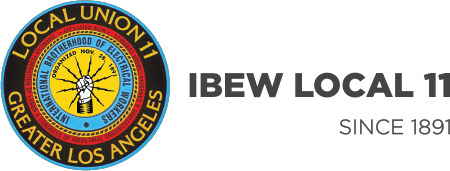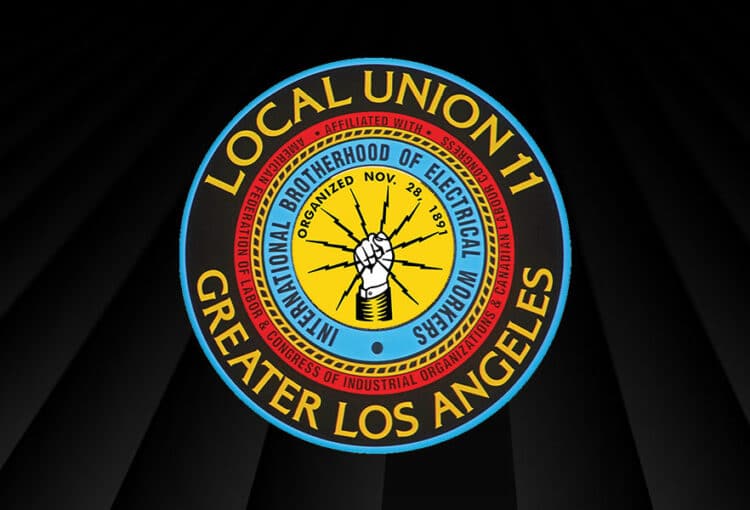Meet Alton Wilkerson, IBEW 11’s New Apprentice Coordinator
In March, longtime Local 11 member and former organizer Alton Wilkerson became the local’s new apprentice coordinator, overseeing the largest electrical apprenticeship program in the United States. News@11 caught up with Wilkerson — a former Local 11 apprentice himself — and asked him about his career and his vision for the future.
News@11: Congratulations on the new post. How did this opportunity come about for you?
Alton Wilkerson: The previous coordinator left the position, and our business manager presented the opportunity to me.
News@11: Why do you think Joel Barton approached you? What do you feel makes you the right person for this job?
AW: I’m younger and tech-savvy, which I think makes me more accessible to the apprentices. I’ve got a lot of years left to go at this (laughs). I was an organizer for Local 11, and I think my hard work and the effort I put into the position showed that I could do a lot as the apprentice coordinator.
News@11: Once you took the position, what kinds of things did you have to do to familiarize yourself with the job?
AW: There’s an IBEW coordinator and a NECA coordinator who represents the contractors, and he’s been in the position for quite some time. I spoke with him about some of his experience to kind of get some guidance. We still have Eric Brown, who was the coordinator some years back, and I spoke with him for some mentorship in this position to try to get a better understanding of what it entails.
News@11: What are some of your responsibilities?
AW: Currently, I dispatch apprentices to job sites. So, basically, when they’re out of work, they come to the hall to be dispatched out to a new contractor if they parted ways with the previous contractor. I try to do my best to get a sense of the type of work they’ve done in the past, and I try to gravitate toward getting them to do something they haven’t done yet. We are trying to ensure that we have well-rounded electricians by the time they finish their apprenticeship program. I also deal with everything related to disciplinary actions with apprentices.
I was an organizer prior to becoming a coordinator. We hear lots of stories about guys asking for their raise, then not getting it for a year or two years, or working at the same pay rate for three to four years. As a union member, you can count on a raise every six months, and you know that it’s due. Especially as an apprentice, you know exactly what your raise is going to be, and you know when you’re going to get it. We’re fortunate to be part of a union, where our benefits take care of our families so your spouse and your children are taken care of. We also have multiple retirement programs that allow us to have a good way of living after our career is done. So, it’s a very beautiful thing.
News@11: What are some of your goals for the Apprenticeship Program?
AW: I definitely want to try to bring some things into today’s age and technology. Some of our procedures can be updated to make the process more convenient for our apprentices. I want to make sure that we have a culture in which our apprentices are treated fairly. I want them to feel comfortable with coming to the coordinator about issues they may have, regardless of what it may be. It could be on a job site; it could be with the schooling. I want them to be comfortable speaking to me even about aspects of their personal life, if that’s something they want to talk about. I want everybody to be comfortable speaking with me on any level about any matter.
News@11: You were a Local 11 apprentice yourself once, right? What do you remember from that experience?
AW: Everything (laughs). I went through the apprenticeship program from 2009 to 2014, and not much has changed. It was a very big learning experience for me going through the apprenticeship, as I had no experience as an electrician prior to joining this trade. I went through apprenticeship and I was fortunate to be with a company that did a variety of different types of electrical installations, so I saw quite a few different projects. I helped build a lab for cancer research. I worked in a refinery. I did some solar work. I built a school for the police department. I was very fortunate throughout my apprenticeship and had quite a few mentors along the path.
News@11: Such as?
AW: Definitely Eric Brown, Shomari Davis and Big John… quite a few people.
News@11: Tell me more about your career in Local 11. What made you deepen your involvement with the union?
AW: Around the second year of my apprenticeship, I really started to get involved in some of the extracurricular activities. I got involved with the Electrical Workers Minority Caucus. They did a lot for the local and a lot in the community as well, which really made me gravitate toward the organization. From that point, I just got really involved, so if there were political meetings where we needed to show up and fight for jobs, I was there. If we had events like the day at the beach, I was always involved. I got involved in whatever committees I could help out with. Anything and everything that I could do to help out the local, I got involved in.
I also attended a couple of conferences, and I noticed that there were other locals that had young workers groups. So, I asked the current business manager, “Would it be OK to start a young workers organization?” He said, “Yeah, no problem!” At the time, we called it the Next Generation Youth Caucus, but a few years later, IBEW created RENEW: Reach Out and Engage Next Generation of Electrical Workers, and we adopted that name after a couple of years of being a group. Now our RENEW group is thriving. I’m not the president of that anymore, but I spent some years getting that one off the ground. It’s like my little baby, so I’m glad to see where it is now.
News@11: What made you become an electrician? Has that been a long-time interest?
AW: No. I’m a car guy. My hobbies are fixing up old hot rods and stuff, and I had no construction background whatsoever. I visited a jobsite prior to joining, just to see what it was about and the type of work they were doing — to make sure it was something I wanted to be a part of. They were building a school — a high school for LAUSD — and some of the steel was going up for the building, but a lot of it was still dirt. I was just amazed at what I was seeing at the time, with all the conduit and the grout. It was really cool to see something that was going to form itself into an entire high school. It definitely sparked my interest.
News@11: Will you share a bit about your personal life? Are you from L.A. originally? How about your family?
AW: I’m from South L.A. I’m married. Our oldest son is 22. Our daughter is 13 and she just graduated from middle school, and our youngest son is 10. My wife and I have been together for 16 years, and we’ve been married for 13.
News@11: What are some of the things that are important about being part of a union? What does a union do for its members?
AW: By being a part of a union, you have union representation who collectively bargain for you. You don’t have to fight for your wages or your benefits; that’s a benefit of being part of a union. If you feel somebody is doing something unsafe or trying to get you to do something unsafe, you have your union representatives come out and take care of it. Even if it’s just a matter of somebody trying to degrade you or talk down to you, you don’t have to take things like that. That’s why we’re here, to make sure that everybody’s on an equal playing field and that everyone is respected as a sister and brother in our trade.







